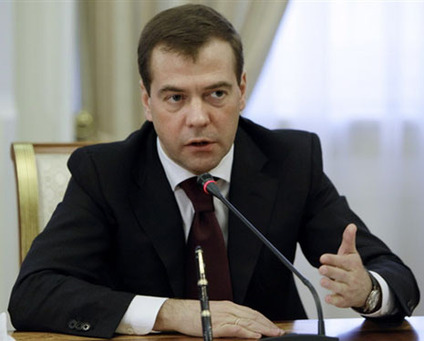 Brazilian President Luiz Inacio Lula da Silva's visit to Iran this weekend could be the last opportunity to reach an agreement with Tehran and to avoid U.N. Security Council sanctions, Russian President Dmitry Medvedev said Friday.
Brazilian President Luiz Inacio Lula da Silva's visit to Iran this weekend could be the last opportunity to reach an agreement with Tehran and to avoid U.N. Security Council sanctions, Russian President Dmitry Medvedev said Friday.
"Given that my friend President Lula is an optimist, I will also be an optimist, and estimate it [the probability of his successful mission to Tehran] at 30 percent," Medvedev said with a chuckle. He spoke in a televised joint press conference with Lula after Russian-Brazilian talks in Moscow.
"I am very much counting on the mission of the Brazilian president to be successful," he added, switching to a serious tone.
"This could be the last chance before the U.N. Security Council makes the already known decisions," Medvedev said, referring to the U.N. decision on imposing sanctions against Iran.
"Yesterday, we discussed this issue on the phone with the United States president, bearing in mind that we need a consolidated position on this issue. And I said that, in my opinion, it is necessary to give the Brazilian president an opportunity to use the entire set of arguments that the international community has at the moment, to persuade Iran to begin cooperating," Medvedev said.
"If there are no changes [in the Iranian position], if attempts to persuade Iran in favor of relevant forms of cooperation fail, then the international community will be compelled to act according to the approaches that are also being discussed by the sextet. I would not like the situation to develop that way. Nevertheless, I can't exclude it."
The sextet refers to the six nations that have been dealing with the Iran nuclear issue - China, France, Germany, Russia, the United Kingdom and the United States.
The Brazilian president, for his part, said: "I am going there realizing that the dialogue that will take place is vital and I will try to use all my power of persuasion in this dialogue," according to the translation on the Kremlin website. "I will try to do my best to arrive at some sort of an agreement. I am flying to Iran convinced that we will find it."
The Brazilian president said that it is his goal to persuade his counterpart, Mahmoud Ahmadinejad, to cooperate with the international community.
"With every day bringing the talks in Iran closer, I am becoming a greater optimist," Lula said. "I was an optimist yesterday, and I am much more of an optimist today. And probably I will be an even greater optimist after meeting President Ahmadinejad."
Medvedev noted that currently there are few differences among the sextet of mediators on the Iranian nuclear problem, calling their approach a "consolidated" one.
"The general approaches are invariable, and virtually all countries adhere to them," he said.
"Firstly, Iran's nuclear program must be peaceful. Secondly, it should be controlled by the IAEA [International Atomic Energy Agency]. Thirdly, Iran must cooperate with the international community and the IAEA, and in the fourth place, Iran must observe the rules concerning the non-proliferation of nuclear technologies," Medvedev said.
The Russian and U.S. presidents discussed various bilateral and international issues in a phone call on Thursday that lasted for more than an hour and a half, according to the Kremlin press office. Medvedev and President Barack Obama discussed Iran's nuclear problem in detail, it said.



